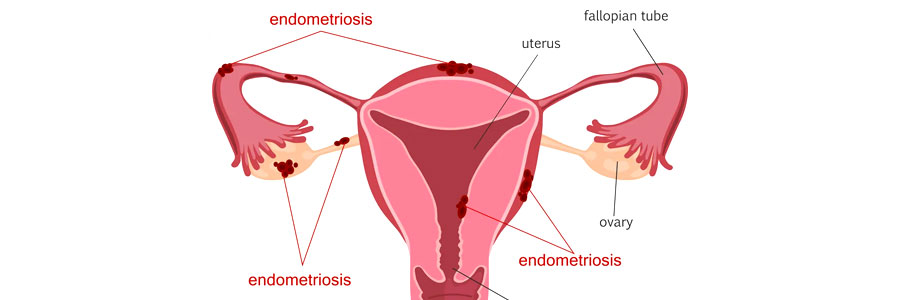Services
Endometriosis

Endometriosis is a chronic and often painful gynecological condition characterized by the presence of endometrial-like tissue outside the uterus. This tissue, which normally lines the inside of the uterus and sheds during menstruation, can implant and grow on other pelvic organs such as the ovaries, fallopian tubes, and the lining of the pelvis.
Here's an overview of endometriosis:
Symptoms:
- The most common symptom of endometriosis is pelvic pain, which may vary in intensity and may occur before, during, or after menstruation.
- Other symptoms may include painful periods (dysmenorrhea), chronic pelvic pain, pain during intercourse (dyspareunia), infertility, heavy menstrual bleeding (menorrhagia), painful bowel movements or urination during menstruation, and fatigue.
Causes:
- The exact cause of endometriosis is not fully understood, but several theories exist, including retrograde menstruation (backflow of menstrual blood into the pelvic cavity), immune system dysfunction, hormonal imbalances, genetic factors, and environmental influences.
- While retrograde menstruation is considered a common contributing factor, not all women with retrograde menstruation develop endometriosis, suggesting that other factors may also play a role.
Diagnosis:
- Endometriosis can be challenging to diagnose as symptoms can vary widely among individuals and may mimic other conditions. Diagnosis typically involves a combination of medical history, pelvic examination, imaging studies (such as ultrasound or MRI), and laparoscopy (a surgical procedure to visualize and biopsy endometrial-like tissue).
- Laparoscopy is considered the gold standard for diagnosing endometriosis as it allows for direct visualization and biopsy of endometrial-like lesions.
Impact on Fertility:
- Endometriosis can affect fertility by causing pelvic adhesions, inflammation, and structural abnormalities that interfere with the normal function of the reproductive organs.
- While endometriosis is associated with infertility, not all women with endometriosis are infertile, and many can conceive with or without treatment. Fertility treatments such as IVF may be necessary for some women with endometriosis-related infertility.
Lifestyle Management:
- Certain lifestyle modifications may help manage symptoms and improve quality of life for women with endometriosis, including regular exercise, dietary changes, stress management techniques, and complementary therapies such as acupuncture or physical therapy.
